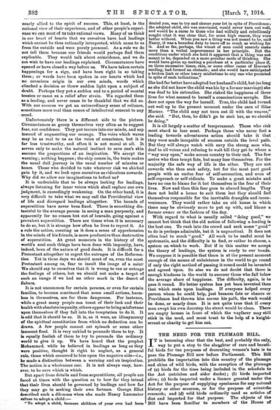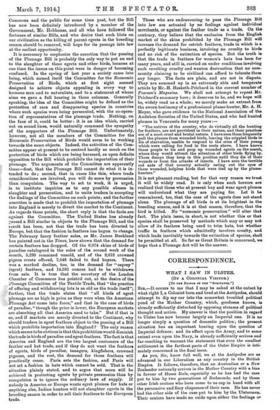THE NEED FOR THE PLUMAGE BILL.
IT is becoming clear that the best, and probably the only, way to put a stop to the slarighter of rare and beauti- ful birds for the purposes of decorating women's hats is to pass the Plumage Bill now before Parliament This Bill prohibits the importation into this country of the plumage and skins of wild birds, with the exception of the plumage of (a) birds for the time being included in the schedule to the Act (ostriches and eider ducks) ; (1) birds imported alive; (c) birds imported under a licence granted under the Act for the purpose of supplying specimens for any natural history or other museum, or for the purpose of scientific research; and (d) wild birds ordinarily used as articles of diet and imported for that purpose. The objects of the Bill bare been familiar to members of the House of Commons and the public for some time past, but the Bill has now been definitely introduced by a member of the Government, Mr. Hobhouee, and all who have followed the fortunes of similar Bills, and who desire that such blots on our civilization as the killing of parent egrets in the breeding season should be removed, will hope for its passage into law at the earliest opportunity.
It is necessary to emphasize the assertion that the passing of the Plumage Bill is probably the only way to put an end to the slaughter of these egrets and other birds, because at one time the issues on this point were in danger of becoming confused. In the spring of last year a society came into being, which named itself the Committee for the Economia Preservation of Birds, which at first sight seemed designed to achieve objects appealing in every way to humane men and to naturalists, and to a statement of whose aims we gave a full hearing in these columns. Generally speaking, the idea of the Committee might be defined as the protection of rare and disappearing species in countries where such species were being persecuted, with the co-opera. tion of representatives of the plumage trade. Nothing, on the face of it, could be better it is an idea which, carried out on sound lines, would naturally command the sympathy of the supporters of the Plumage Bill. Unfortunately, however, not all the members of the Committee for the Economic Preservation of Birds would seem to be working towards the same objects. Indeed, the activities of the Com- mittee appear at present to be centred hardly so much on the protection of birds which are being harassed, as upon definite opposition to the Bill which prohibits the importation of their plumage. The arguments of the Committee are apparently these—first, that the Plumage Bill cannot do what it is in- tended to do ; second, that in cases like this, where trade considerations are involved, you will do more by persuasion than compulsion. The way to set to work, it is urged, is to institute inquiries as to any possible abuses in slaughter and persecution, and to unite traders in accepting the findings of the Committee on such points ; and the further assertion is made that to prohibit the importation of plumage into England is merely to divert the market to the Continent. As regards these points, the short reply is that the facts are against the Committee. The United States has already passed a Bill similar in objects to the Plumage Bill, and the result has been, not that the trade has been diverted to Europe, bat that the fashion in feathers has begun to change. The February fancy feather sales, as Mr. James Buckland has pointed out in the Times, have shown that the demand for certain feathers has dropped. Of the 6,974 skins of birds of paradise catalogued in the sales of the second week of the month, 5,230 remained unsold, and of the 8,618 crowned pigeon crests offered, 7,648 failed to find buyers. There was a marked decline, too, in the demand for " osprey " (egret) feathers, and 14,592 ounces had to be withdrawn from sale. It is true that the secretary of the London Chamber of Commerce has pointed out, at the desire of the Plumage Committee of the Textile Trade, that "the practice of offering and withdrawing lots is as old as the trade itself'; further, that the trade states that "all kinds of egret plumage are as high in price as they were when the American Plumage Act came into force," and that in the case of birds of paradise, " though the price is lower, the European markets are absorbing all that America used to take." But if that is so, and if markets are merely diverted to the Continent, why should traders in egret feathers object to the passing of a Bill which prohibits importation into England ? The only reason which seems to be obvious is that this prohibition would diminish the trade in birds of paradise and egret feathers. The fact is that America and England are the two largest customers of the feather and hat trade, and if they do not want the feathers of egrets, birds of paradise, tanagers, kingfishers, crowned pigeons, and the rest, the demand for those feathers will practically cease. Paris sets the fashion, and Paris will not set a fashion in hats which cannot be sold. That is the situation plainly stated, and to argue that more will be achieved in protecting egrets by private persuasion than by compulsion is to ignore the ordinary laws of supply. If nobody in America or Europe wants egret plumes for hate or anything else, Indian hunters will not slaughter egrets in the breeding season in order to sell their feathers to the European trade. Those who are endeavouring to pass the Plumage Bill into law are actuated by no feelings against individual merchants, or against the feather trade as a trade, On the contrary, they believe that the exclusion from the English market of the skins prohibited by the Plumage Bill will increase the demand for ostrich feathers, trade in which is a perfectly legitimate business, involving no cruelty to birds and no risk of the extinction of species. But the truth is that the trade in feathers for women's hate has been for many years, and still is, carried on under conditions involving such revolting cruelty and wanton destruction that no com- munity claiming to be civilized can afford to tolerate them any longer. The facts are plain, and are not in dispute. They are summed up in an extremely able and temperate article by Mr..H. Hesketh-Prichard in the current number of Pearson's Ma gasine. We shall not attempt to repeat Mr. Prichard's summary here ; it deserves to be, and we hope will be, widely read as a whole; we merely make an extract from the sworn testimony of a professional plume-hunter, Mr. A. H. Meyer, who gave evidence to the National Association of the Audubon Societies of the United States, and who had hunted plumes in Venezuela for many years "The natives of the country, who do virtually all the hunting for feathers, are not provident in their nature, and their practices are of a most cruel and brutal nature. I have seen them frequent, pull the plumes from wounded birds, leaving the crippled birds to die of starvation, unable to respond to the erica of their young which were calling for food in the mate above. I have known these people to tie and prop up wounded egrets on the marsh, where they would attract the attention of other birds flying by. These decoys they keep in this position until they die of their wounds or from the attacks of insects. I have seen the terrible red ants of that country actually eating out the eyes of these wounded, helpless birds that were tied up by the plume- hunters."
It is not pleasant reading, but for that very reason we trust it will be widely read. It is only when such horrors are realized that those who at present bay and wear egret plume. will understand what they are paying for. Let it be remembered, too, that the case of the egrets does not stand alone. The plumage of all birds is at its brightest in the breeding season, and it is at that season, therefore, that the bird is killed. No "economic preservation" will alter that fact. The plain issue, in short, is not whether this or that species shall be preserved by methods which may or may not allow of its feathers being used to trim bats, but whether traffic in feathers which admittedly involves cruelty, and which leads inevitably towards the extinction of species, shall be permitted at all. So far as Great Britain is concerned, we hope that a Plumage Act will be the answer.















































 Previous page
Previous page